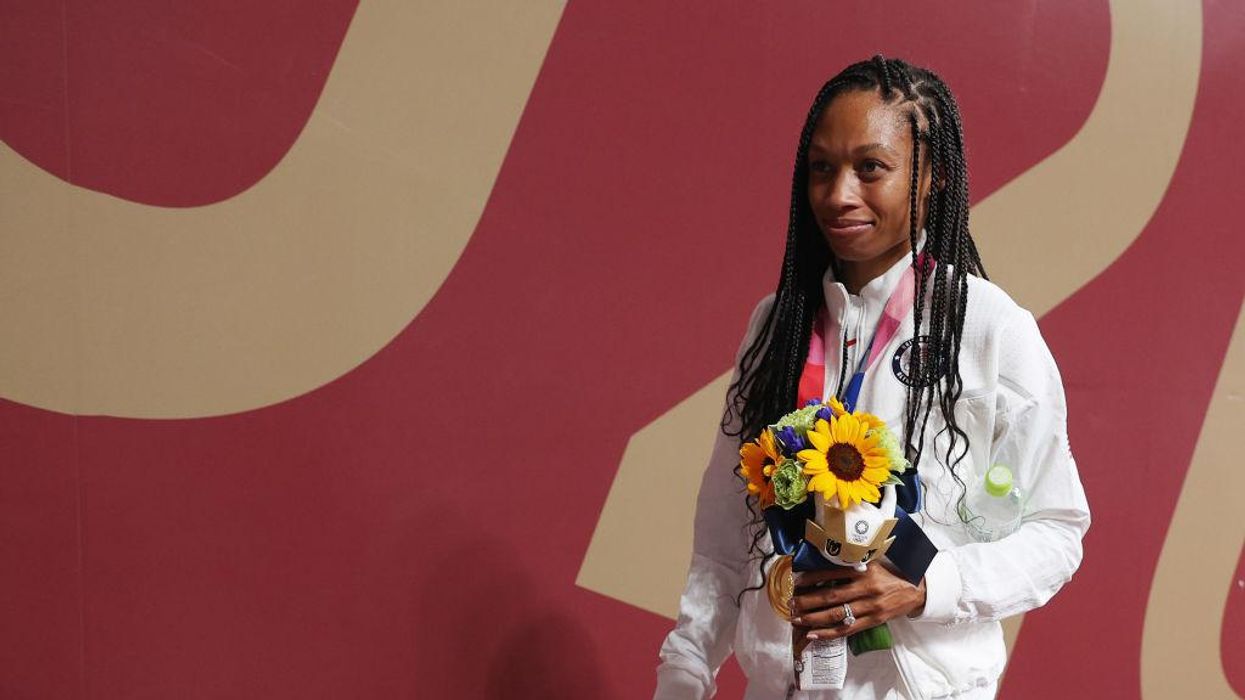
Patrick Smith/Getty Images

No one will remember Allyson Felix as the greatest American track athlete in history. That's because she never told us she was. Nike never told us that, either, so how could she be?
Felix was the most important American athlete at the Tokyo Olympics, right when we needed her most. At 35 and in her final Olympics, she won the gold medal in the 4x400 relay and the bronze in the 400-meter individual sprint. That gave her 11 Olympic medals, making her the most decorated Olympic track athlete in American history, even more so than Carl Lewis. More than Jesse Owens. More than Wilma Rudolph. More than Jackie Joyner-Kersee, Babe Didrikson, Jim Thorpe, or Michael Johnson.
That's not why we needed her so much, though. Felix showed that you can be a superstar in the look-at-me generation without focusing entirely on yourself. You can stand for something socially important to you and at the same time stand up to corporate backers and not sell your soul.
Did we even know someone like Allyson Felix could still exist? Let's hope people get the message, because the Olympics were defined by fallen stars more than superstars. From all appearances, Felix is a healthy, happy, strong, proud new mother with a lot of guts, a lot of money, and a lot of Olympic medals.
By contrast, what do you see when you look at Simone Biles? Or Naomi Osaka? Or Novak Djokovic? They never smiled once. They were hyped up by the GOAT machine – corporate sponsors insisting that they are the best ever and will do even more in Tokyo. And they failed miserably. Grim, unhappy, needing mental help.
It's a trendy thing now to say that Biles and Osaka have "started the discussion" about mental health in sports, or even just among young people. I can see how that's true and important, but it's also important that Felix be in that same discussion.
She is the correct path to the mountaintop, the safest path, the healthiest path. In a world where LeBron James will stand up for social causes except anything that is critical of China and Nike, where his bread is buttered, Felix stood up to Nike, risked her finances, and made real change.
She was under no less pressure than Biles or Osaka to make the most of herself and to be the best. And her stances were always with others in mind.
She did it right.
She decided to start a family and got pregnant in 2018, as her contract with Nike was up. She was offered a new deal, which came, she said, with a 70% pay cut.
Felix felt wronged and also felt that the apparel business in general treated women athletes poorly when they decided to have families. So she stood up for them, as well as herself, in a social justice stance that was genuine and from the heart. She wrote an editorial in the New York Times that said:
"I asked Nike to contractually guarantee that I wouldn't be punished if I didn't perform at my best in the months surrounding childbirth. I wanted to set a new standard. If I, one of Nike's most widely marketed athletes, couldn't secure these protections, who could? Nike declined."
Under Felix's pressure, as well as pressure from other athletes, Nike and the industry buckled. Nike changed its policy.
Felix had an emergency C-section in November 2018 at 32 weeks pregnant because of a health issue that threatened both her life and her daughter's. Felix then became an advocate for health issues regarding black women and pregnancy.
This is the way to do social justice, without corporate direction or a self-aggrandizing marketing plan. The pressure on the mental health of today's athletes is coming from so many places, mostly from social media and excessive parents. And when athletes reach the top, the corporate marketers are waiting for them, to heap on more pressure.
Felix, who was once a prodigy, found her way through it all. We saw her in the Olympic trials on Father's Day needing to finish in the top three. She took the lead, fell back to fourth and fifth, then relentlessly came back and qualified for Tokyo.
All with her daughter, Camryn, in the stands watching.
You rarely take a lead in a sprint, fall behind, and come back. She did it again in Tokyo in the 400 to win the bronze medal.
Is Felix the GOAT of American track and field? I still feel Lewis probably is. You don't always have to be hyped up that way to matter. Felix could be the last role model to prove it.